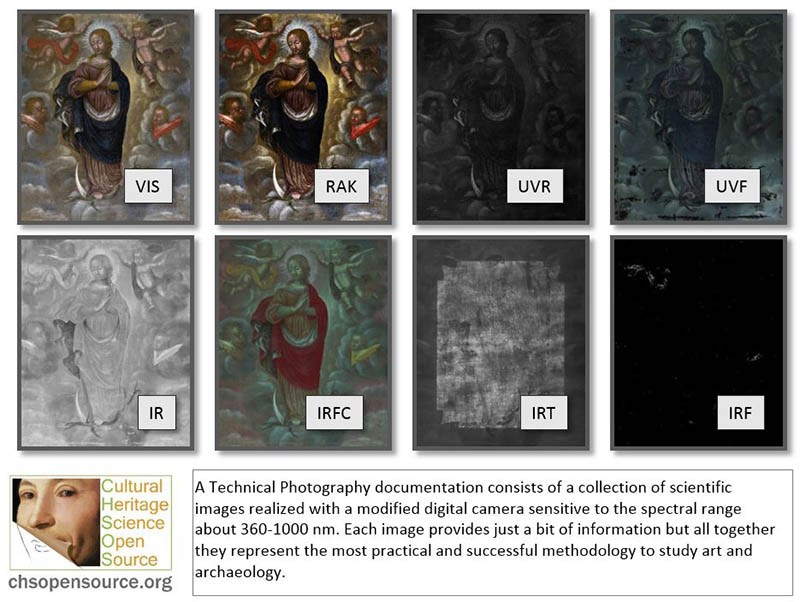Technical Imaging: Practical methods for the scientific examination of fine arts, historical and archaeological objects.
Instructor’s short bio

The Training program will be run by Dr Antonino Cosentino. CHSOS’s director. Dr. Antonino Cosentino is a Ph.D. physicist specialized in Art diagnostics who has taught “Scientific Methods for Art Investigation” in Europe and US. He is an expert in imaging and analytical techniques which he has carried out on important works of art for European and American Institutions and private collectors. For more information on his scientific work visit Dr. Cosentino on Researchgate, Linkedin, and Academia.edu or check out his publications.
Programme:
1st Day (31. January 2018). Technical Photography (~6h)
Technical Photography represents a collection of broadband spectral images realized with a modified full spectrum digital camera and different lighting sources and filters.
We will practice hands-on shooting and editing for these technical photos:
• VIS, Visible (Polarized light Photography)
• RAK, Raking light Photography
• UVF, Ultraviolet Fluorescence Photography
• UVR, Reflected Ultraviolet Photography
• IR, Infrared Photography
• IRT, Infrared Transmitted Photography
• IRF, Infrared Fluorescence Photography
• IRFC, Infrared False Color Photography
2nd Day (1. February 2018). Panoramic Infrared Reflectography, Reflectance Spectroscopy, RTI (~6h)
Infrared Reflectography allows to identify underdrawing and pentimenti. We coupled it with the panoramic method in order to acquire infrared reflectograms with a fast and lightwiegth set up.
Reflectance Spectroscopy (RS) is affordable and it provides information useful for the identification of pigments.
Reflectance Transformation Imaging (RTI) creates a virtual and enhanced visualization of an object’s surface and it is useful in art examination and documentation.
3rd Day (2. February 2018). Multispectral Imaging (~6h)
Multispectral Imaging (MSI) is used to map and tentatively identify pigments and retouchings on works of art. It is also useful to visually enhance old and faded documents
Practical informations
How to get there / address:
Swiss National Museum
Collection Centre
Lindenmoosstrasse 1
8910 Affoltern am Albis
Please use public transports as parking lots are not available at the training site

Detailed schedule:
A detailed schedule will be emailed to registered participants. The trainings will start 9am with plenty of time for hands on experience and discussions during coffee brakes (coffee included).
Lunch:
Lunch is not included. You may bring your own lunch and eat at the cantina of the Collection Centre. Some self serve restaurants are in short walking distance (10 minutes).
Accommodation:
If you need an overnight accommodation we recommend you one of the hotels in the nearer vicinity.
Hotel Holiday Inn Express, Obstgartenstrasse 7, 8910 Affoltern am Albis, +41 44 782 00 00 Questo indirizzo email è protetto dagli spambots. È necessario abilitare JavaScript per vederlo. https://www.ihg.com
Booking / Reservation:
Registration will be on a "first come first serve" basis. Your registration will become valid after payment, therefore we strongly recommend to place your payment via Credit Card or / and PayPal at the check out of the registration process. You may choose bank transfer as well but your registration will be temporary until we have received your payment thus someone may be quicker than your bank and gets the last available seat... hurry up!
Costs / Training fee:
Members of the SCR CHF 790.-
Non-Members: CHF 1'190.-

